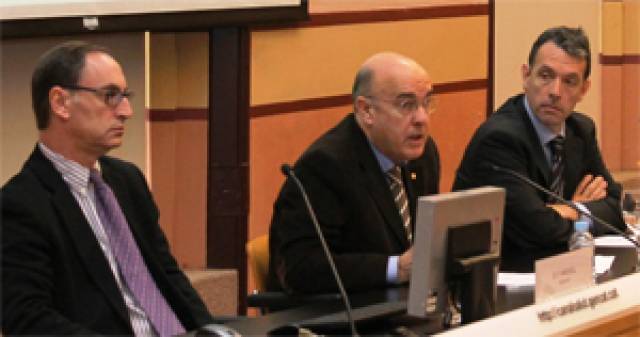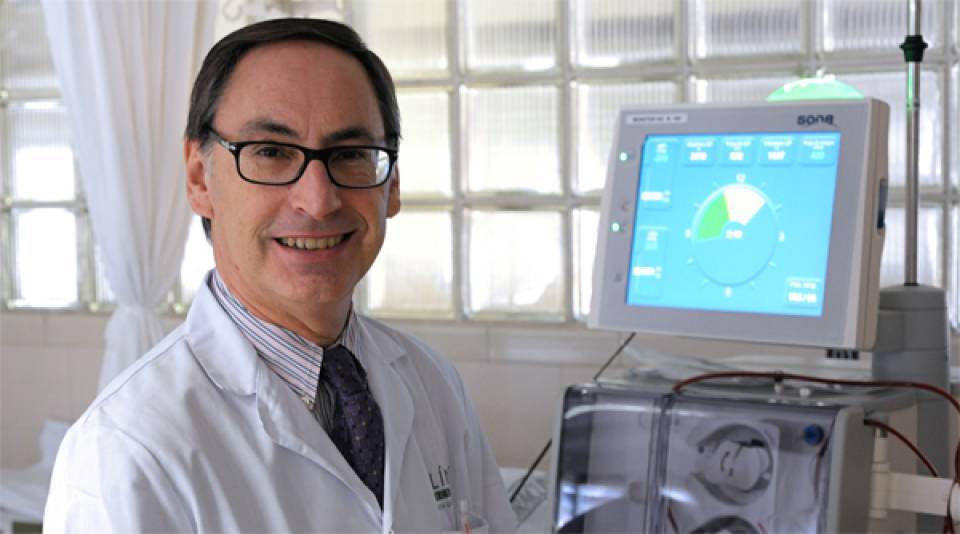Conventional haemodialysis cleans the patient’s blood by a physicochemical process of diffusion, in which the particles to be eliminated pass through a semipermeable membrane. In this way, the blood is freed of toxic particles, which pass into the dialysis fluid. Unlike haemodialysis, OL-HDF adds an additional pressure, called convection, to the process, which means that between 15 and 30 litres of blood ultrafiltrate can be exchanged per session. This technique results in improved cleaning of particles with a higher molecular weight. OL-HDF requires good water treatment, safety filters and analytical monitoring to obtain an ultrapure dialysis fluid for infusion to the patient with the highest level of quality. According to the Statistical Report of the Catalan Register of Kidney Disease Patients (2), there were 3970 patients on haemodialysis in 2010, of whom 29% were benefiting from this technology. This percentage increased from less than 5% before 2007 to 31% in 2011.
Two large clinical trials studying the differences between conventional haemodialysis and OL-HDF have been published in the last year. One was carried out in the Netherlands (3) (714 patients) and the other in Turkey (4) (782 patients), but neither showed significant differences between the two techniques. However, the new study carried out in Catalonia shows that all-cause mortality is reduced by 30%, cardiovascular mortality by 33% and mortality due to infections by 55%. A 22% reduction in hospital admissions and a 28% reduction in episodes of hypotension during the treatment were also observed. The authors suggest that the improved results found in the Catalan study are due to the use of a greater convective volume, with an average of 24 litres per convective treatment. That is to say that the possibilities of OL-HDF have benefited from increasing the additional pressure that this technique uses to filter the blood. In fact, the patients’ progress improved as the convective volume applied was increased. This increase in pressure has physiological limits, and it cannot be increased indefinitely.

References:
(1) Francisco Maduel, Francesc Moreso, Mercedes Pons, Rosa Ramos, Josep Mora-Macià, Jordi Carreras, Jordi Soler, Ferran Torres, Josep M. Campistol, Alberto Martinez-Castelao, for the ESHOL Study Group. High-Efficiency Postdilution Online Hemodiafiltration Reduces All-Cause Mortality in Hemodialysis Patients. Journal of the American Society of Nephrology. Ahead of print.
(2) Registre de malalts renals de Catalunya. Informe estadístic 2010. Comissió de seguiment del registre de malalts renals de Catalunya. Generalitat de Catalunya. Departament de Salut. 1a edició, Maig 2012.
(3) Grooteman MP, van den Dorpel MA, Bots ML, Penne EL, van der Weerd NC, Mazairac AH, den Hoedt CH, van der Tweel I, Lévesque R, Nubé MJ, ter Wee PM, Blankestijn PJ; CONTRAST Investigators. Effect of online hemodiafiltration on all-cause mortality and cardiovascular outcomes. J Am Soc Nephrol. 2012 Jun;23(6):1087-96. doi: 10.1681/ASN.2011121140. Epub 2012 Apr 26
(4) Ok E, Asci G, Toz H, Ok ES, Kircelli F, Yilmaz M, Hur E, Demirci MS, Demirci C, Duman S, Basci A, Adam SM, Isik IO, Zengin M, Suleymanlar G, Yilmaz ME, Ozkahya M; On behalf of the ‘Turkish Online Haemodiafiltration Study’. Mortality and cardiovascular events in online haemodiafiltration (OL-HDF) compared with high-flux dialysis: results from the Turkish OL-HDF Study. Nephrol Dial Transplant. 2013 Jan;28(1):192-202. Epub 2012 Dec 9

